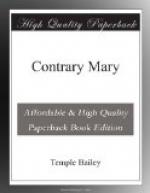Over the stretches of that barren country they came to hear him, sailing in their schooner-wagons toward the harbor of the hope which he brought to them.
When he had preached from his pulpit, he had talked to men and women of culture and he had spent much of his time in polishing a phrase, or in rounding out a sentence. But now he spent his time in search of the clear words which would carry his—message.
For Mary had said that every man who preached must have a message.
Mary!
How far she had receded from him. When he thought of her now it was with a sense of overwhelming loss. She had chosen to withdraw herself from him. In every letter he had seen signs of it—and he could not protest. No man in his position could say to a woman, “I will not let you go.” He had nothing to offer her but his life in the pines, a life that could not mean much to such a woman.
But it meant much to himself. Gradually he had come to see that love alone could never have brought to him what his work was bringing. He had a sense of freedom such as one must have whose shackles have been struck off. He began to know now what Mary had meant when she had said, “I feel as if I were flying through the world on strong wings.” He, too, felt as if he were flying, and as it his wings were carrying him up and up beyond any heights to which he had hitherto soared.
He slept that night in one of the rare groves of old pines. He made a couch of the brown needles and threw a rug over them. The air was soft and heavy with resinous perfume. As he lay there in the stillness, the pines stretched above him like the arches of some great cathedral. His text came to him, “Come thou south wind and blow upon my garden.” It was a simple people to whom he would talk on the morrow, but these things they could understand—the winds of heaven, and the stars, and the little foxes that could spoil the grapes.
When he woke there was a mocking-bird singing. He had gone to sleep obsessed by his sermon, uplifted. He woke with a sense of loneliness—a great longing for human help and understanding—a longing to look once more into Mary Ballard’s clear eyes and to draw strength from the source which had once inspired him.
John Ballard’s Bible lay on the rug beside him. He opened it, and the leaves fell apart at a page where a rose had once been pressed. The rose was dead now, and had been laid away carefully, lest it should be lost. But the impress was still there, as the memory of Mary’s frank friendliness was still in his mind.
It was a long time before he closed the book. But at last he sighed and rose from his couch. It was inevitable, this drifting apart. Fate would hold for Mary some brilliant future. As for him, he must go on with his work alone.
Yet he realized, even in that moment of renunciation, that it was a wonderful thing that he could at last go on alone. A year ago he had needed all of Mary’s strength to spur him to the effort, all of her belief in him. Now with his heart still crying out for her, needing her, he could still go on alone!




